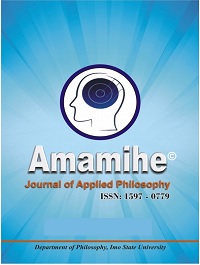RATIONALIZATION: ITS EFFECTS ON AFRICAN TRADITIONAL RELIGION
Abstract
Rationalization, the process through which traditional beliefs and practices are systematically analyzed and adapted to fit modern frameworks, poses significant challenges to African Traditional Religion (ATR), which has long been the bedrock of African identity, spirituality, and cultural heritage. This paper investigates the multifaceted effects of rationalization on ATR, exploring how the shift towards logical and empirical explanations undermines the mystical and spiritual dimensions intrinsic to indigenous practices. This paper aims to contribute to the discourse on the ongoing tension between modernization and the preservation of indigenous cultural practices, ultimately advocating for a balance that respects both traditional and contemporary dimensions of African spirituality. This research makes use of the culture-area approach method in its work. It recommends, among other the avoidance of over-rationalization, reductionism, and disconnection from communal practices. By acknowledging and navigating these complexities, ATR can maintain its unique spiritual and cultural heritage while adapting to the challenges and opportunities of the modern world.


